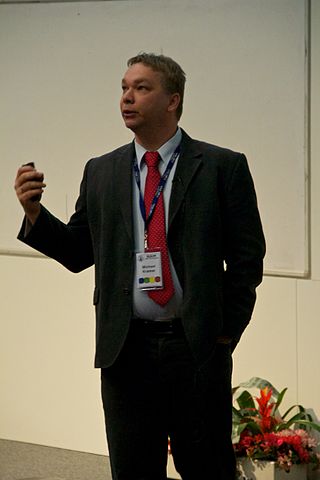Michael Kramer (astronomer)
German radio astronomer and astrophysicist From Wikipedia, the free encyclopedia
Michael Kramer (born 1967 in Cologne) is a German radio astronomer and astrophysicist. He currently serves as a Director at the Max Planck Institute for Radio Astronomy in Bonn. He is also a professor at the University of Manchester and an Honorary Professor at the University of Bonn.

Awards
The Royal Astronomical Society, London, honoured Michael Kramer with the 2013 Herschel Medal for his work in the field of gravitational physics.[1]
He gave the 2016 George Darwin lecture with the title, `Probing Einstein's Universe and its physics – the joy of being curious.’[2]
He was one of the recipients of the 2020 Breakthrough Prize in Fundamental Physics, as a member of the Event Horizon Telescope Collaboration.[3]
Selected publications
- D Thornton; B Stappers; Matthew Bailes; et al. (1 July 2013). "A population of fast radio bursts at cosmological distances". Science. 341 (6141): 53–56. arXiv:1307.1628. Bibcode:2013Sci...341...53T. doi:10.1126/SCIENCE.1236789. ISSN 0036-8075. PMID 23828936. Wikidata Q34037440.
- John Antoniadis; Paulo C C Freire; Norbert Wex; et al. (1 April 2013). "A massive pulsar in a compact relativistic binary". Science. 340 (6131): 448, 1233232. arXiv:1304.6875. Bibcode:2013Sci...340..448A. doi:10.1126/SCIENCE.1233232. ISSN 0036-8075. PMID 23620056. Wikidata Q34341376.
- M. Kramer; I. H. Stairs; R. N. Manchester; et al. (14 September 2006). "Tests of general relativity from timing the double pulsar". Science. 314 (5796): 97–102. arXiv:astro-ph/0609417. Bibcode:2006Sci...314...97K. doi:10.1126/SCIENCE.1132305. ISSN 0036-8075. PMID 16973838. Wikidata Q34566230.
References
Wikiwand - on
Seamless Wikipedia browsing. On steroids.
